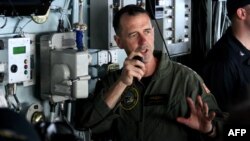The United States Navy is closely watching Iranian behavior in the Gulf and expects a "period of uncertainty" and increased level of alertness after President Donald Trump's decision to withdraw from an international nuclear deal with Iran, the U.S. Navy chief said on Monday.
Trump said last week that the United States was withdrawing from a 2015 deal negotiated by the Obama administration.
The withdrawal has upset Washington's European allies, cast uncertainty over global oil supplies and raised the risk of conflict in the Middle East.
"It is a period of uncertainty that we are entering into right, how the whole world will respond to this latest development," Chief of U.S. Naval Operations Admiral John Richardson told a small group of reporters.
"(We have to) remain alert, I mean even a little bit more alert than usual to just be open to any kind of response or new development or something like that," Richardson added.
He was speaking after visiting the aircraft carrier George H.W. Bush off the coast of Virginia where U.S. and French troops are carrying out joint training.
Richardson said the U.S. Navy had not seen provocative Iranian behavior in the Gulf since Trump's announcement, but was watching closely.
In recent years, there have been periodic confrontations between the Islamic Revolutionary Guard Corps (IRGC), a branch of Iran's armed forces, and U.S. military in the Gulf - a major trade route for oil - but there have been no major incidents since last year.
Last August, U.S. officials said an Iranian drone came within 30 meters of a U.S. Navy warplane as it prepared to land on an aircraft carrier in the Gulf.
Iran, which sees the Gulf as its backyard and believes it has a legitimate interest in expanding its influence there, has long argued that the region should organize its own security collectively, without outside powers.
US Navy Expects 'Uncertainty' in Gulf After Iran Deal Withdrawal
- By Reuters

ABOARD A MILITARY AIRCRAFT —




